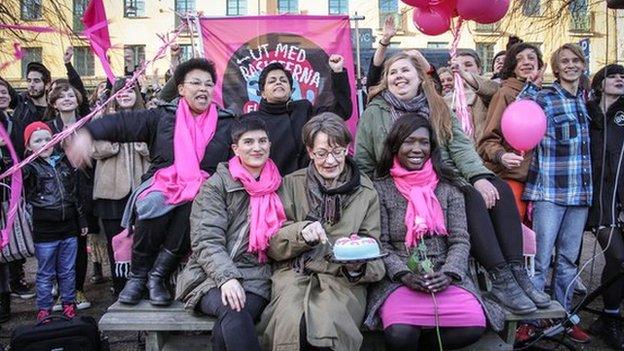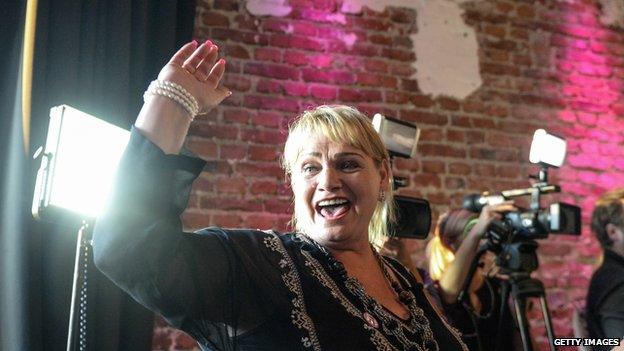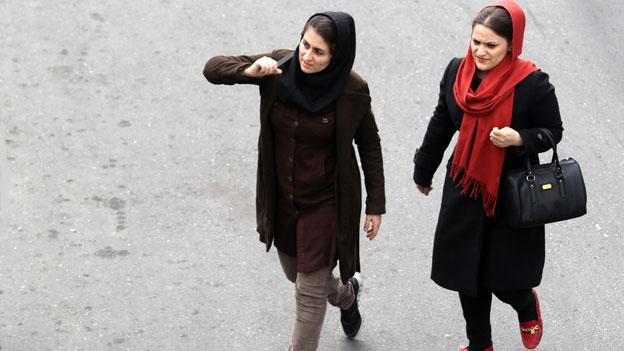Feminist Initiative shakes up politics in Sweden and Norway
- Published

Sweden's Feminist Initiative celebrates its rising membership
Feminism has been enjoying a popular resurgence in much of Europe - but in Sweden and Norway it is becoming a political force. What does the growth of a feminist party in both countries mean for mainstream politics and the fight for equality?
Cathrine Linn Kristiansen does not look like a typical politician.
At 27, she is unusually young to be leading a party, and her oversized glasses and pink lipstick betray a striking fashion sense.
Ms Kristiansen has no parallel in most European countries - she is a party candidate campaigning on a purely feminist platform.
She will be standing in local elections in Oslo for Feminist Initiative (Fi) in the autumn. The party, founded in Sweden 10 years ago, launched in neighbouring Norway last week and announced it would be fielding candidates in Oslo and Bergen.
"We have waited long enough for other parties to get their act together," Ms Kristiansen says.

Cathrine Linn Kristiansen says the Feminist Initiative in Norway will have male board members
Anger over government proposals to give doctors more power to refuse abortions has driven demand for a feminist party in Norway in the past two years, Ms Kristiansen says.
And not enough is being done to reduce the gender pay gap and domestic violence, she adds.
Although Norway does better than most European countries, external on pay equality, women still earned 86.4% of what men earned in 2014, according to Statistics Norway (in Norwegian), external. The gender gap is wider in high-level jobs.
Footage of the stunt, provided to the BBC by Feminist Initiative, raised publicity for the feminist party in 2010
The party's launch in Norway comes amid a wider debate in Europe about quotas for women on company boards. Germany passed a law in March requiring large businesses to make sure at least 30% of their board members are women.
While other countries have politicians who say they are feminist, few have active political parties based on that alone.
There are no such parties standing in the UK's general election in May, but Justice for Men and Boys, an anti-feminist party that gives out "Lying Feminist of the Month" awards, is contesting two seats.
Off the hook?
Feminism can be hard to define. But Ms Kristiansen, who works in welfare administration, says it can be applied to any political topic - from financial policy to infrastructure.
"It's not just a fight for women's rights. It's about representing minorities and people who suffer discrimination.
"We want to be the party that does not let equality and anti-racism demands disappear, in the face of other issues."
Her party is seeking to follow the success of Feminist Initiative in Sweden, which elected its first MEP, Soraya Post, in May 2014 with the slogan, "Replace the racists with feminists!"
Some critics decried the move, saying it would let mainstream parties off the hook, external when it came to representing women.

Soraya Post is the first MEP elected on a feminist platform and Sweden's first Roma political candidate
But as Feminist Initiative in Sweden celebrated its 10th anniversary this week, founder Gudrun Schyman said the party's greatest achievement so far had been "keeping gender equality questions on the agenda".
"In many countries in Europe we can see there are reactionary and nationalistic parties gaining power," she told the BBC.
"That means that the mainstream parties are often taking up these other parties' agendas, rather than discussing human rights."
Fi says its influence has led to Sweden's government calling itself "feminist", which it says played a role in the current diplomatic row with Saudi Arabia. Last month the Saudi ambassador to Sweden was recalled after Sweden ended an arms deal, in a dispute over human rights.
Commentators say much of Fi's rise is down to publicity efforts by Ms Schyman, whose stunts included burning 100,000 kronor ($13,000; £8,500) in a protest at unequal pay in 2010.
The former Left Party leader is backed by Swedish pop stars such as Robyn, The Knife, and Benny Andersson from Abba, while Pharrell Williams voiced his support for Fi on stage ahead of Sweden's general elections last September.
The party narrowly missed out on a seat in parliament. But Ms Schyman is unwavering when she says: "In the long run we will be part of the national government."
'Part of a trend'
It remains to be seen whether the Fi in Norway will be quite so effective. But despite its humble beginnings - launching in the canteen at Bergen Town Hall in March - it is already starting to make waves.

Pharrell Williams invited Gudrun Schyman on stage with him last September
"A lot of people on the left are nervous because they fear that Feminist Initiative will steal votes from the established parties," says Andreas Halse, a Norwegian newspaper columnist and former Socialist Youth leader.
He is unsure how successful the party will be, but says they are part of a trend in Norway, attracting a lot of media attention.
"A lot of people feel that feminist issues are not being taken seriously enough by established parties."
Claire McGing, a political geography lecturer at Maynooth University in Ireland, says green parties in different countries have in the past created a focus on environmental policies, and she says feminist parties could have a similar impact.
Ms Schyman says new Fi groups are setting up in countries including Denmark, Finland, Spain and Poland.
So could Europe see feminism influence politics more widely?
"There has been a resurgence in feminism more generally across Europe, particularly amongst a younger generation of women," says Ms McGing.
"The experiences of women's and feminist parties in the past suggest that the real impact seems to be on other parties."
- Published6 March 2015

- Published24 July 2014

- Published5 March 2015
